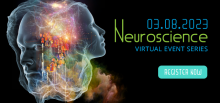
The free, online-only Labroots event will be broadcast live on March 8, 2023, starting at 5:30 a.m. PST and features concurrent tracks on artificial neural networks, neurodegenerative disease research, and psychiatric disease markers.
The 11th Annual Neuroscience Virtual Event Series organized by Labroots provides neuroscientists with an online platform to converge and discuss the latest advances in neuroscience. Building on a tradition of previous participation at this event, the NIH BRAIN Initiative returns this year with a session focused on artificial intelligence (AI) and its applications to neuroscience.
Given tremendous advances in AI technologies in the last few years, and the promise they hold for accelerating research in neuroscience, the NIH BRAIN Initiative has brought together scientists to stimulate discussion on how neuroscience research can benefit from work in artificial neural networks and explainable AI. Keynote talks by Drs. Guangyu Robert Yang and Marzyeh Ghassemi will touch on newer neural network models of brain function as well as machine learning for equitable health systems. A plenary panel moderated by Dr. Konrad Kording will conclude the day with a discussion on the role of AI in neuroscience, and the challenges and opportunities at the interface of AI and neuroscience for understanding how the brain generates behavior.
The full agenda for the NIH BRAIN Initiative track titled “Artificial Neural Networks and Explainable AI models at the Service of Neuroscience Research” is as follows:
Keynote presentation: Guangyu Robert Yang, Ph.D., MIT: Towards Multi-system Neural Network Models of Brain Functions
Keynote presentation: Maryzeh Ghassemi, Ph.D., MIT: Designing Machine Learning Processes for Equitable Health Systems
Christopher Cueva, Ph.D., MIT: Recurrent Neural Networks in Brains and Machines
Joshua Glaser, Ph.D., Northwestern: Interpretable Latent Variable Models Demonstrate Flexible Neural Control of Spinal Motor Units
Chengxu Zhuang, Ph.D., MIT: Neural Network Models of Visual Learning and Development
Guillermo Cecchi, Ph.D., T.J. Watson IBM Lab: Leveraging What We Know: Knowledge Discovery and Knowledge Exploitation as Complementary Aspects of Explainable AI
Jagath Rajapakse, Ph.D., Nanyang Technical University: Explainable AI with Applications for Brain Imaging and Drug Discovery
Panel presentation: Ramin Hasani, Ph.D. & Mathias Lechner, Ph.D., MIT: Liquid Neural Networks
Plenary panel: Konrad Kording, Ph.D., University of Pennsylvania, Guillermo Cecchi, Ph.D., T.J. Watson IBM Lab, and Chengxu Zhuang, Ph.D., MIT: Challenges and Opportunities of Artificial Intelligence in Neuroscience and Explainability
In addition to the NIH BRAIN Initiative track, the Labroots virtual platform offers content-rich programming on emerging developments and breakthroughs from scientists at the cutting-edge of neuroscience research. More information about the event including the agenda and registration information can be found at the event website.
